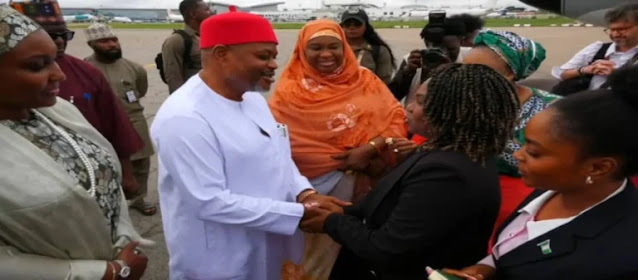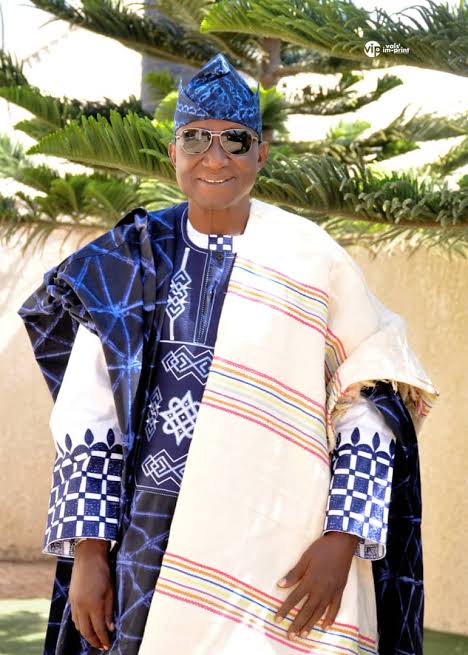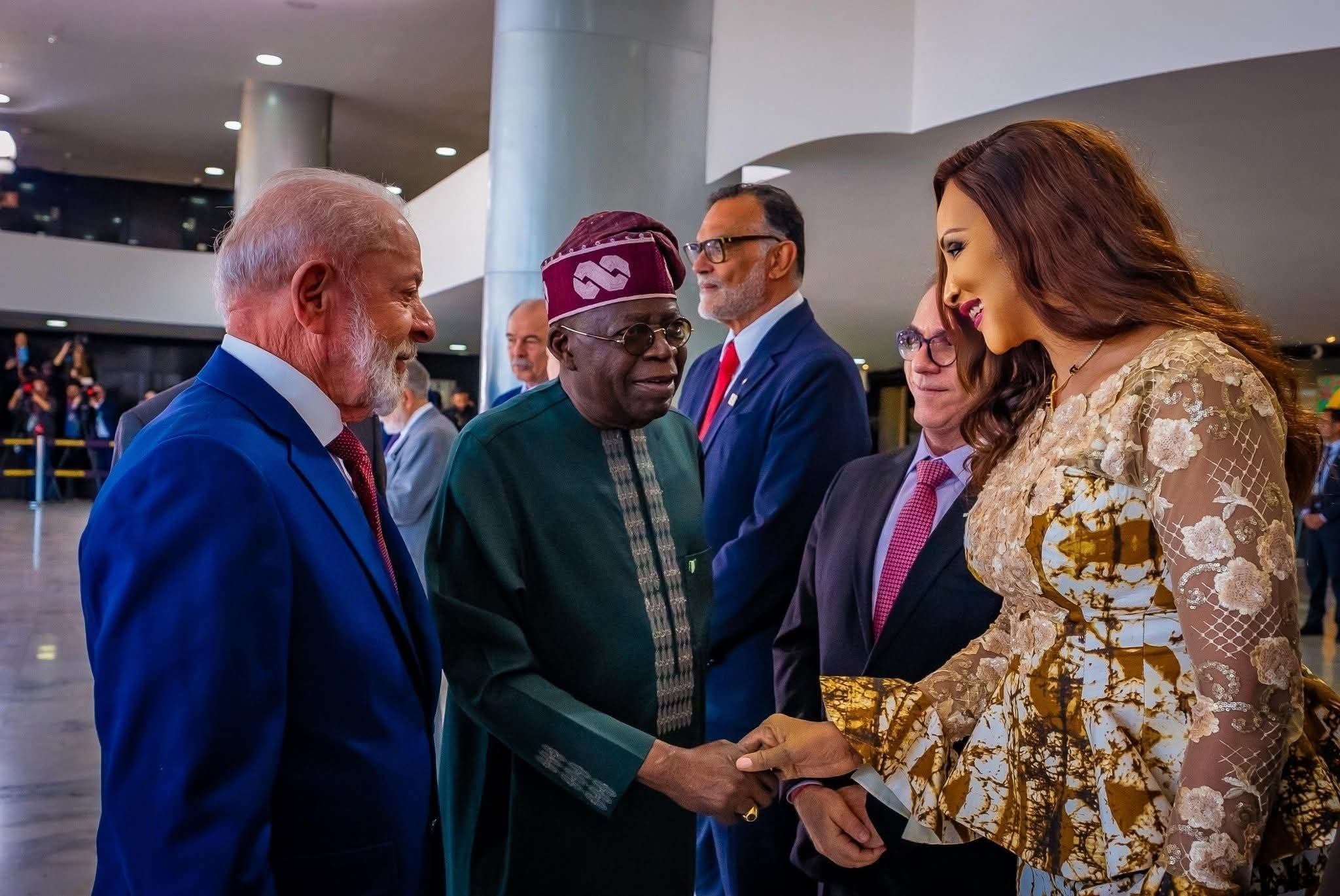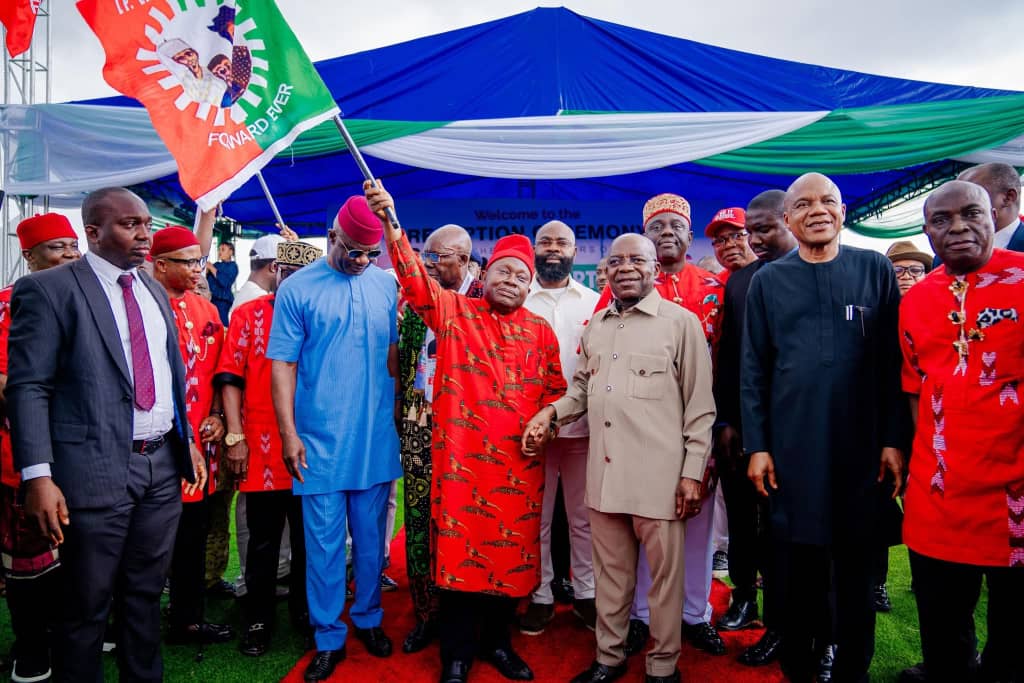On Saturday, August 30, 2025, Vice-President Francia Márquez of Colombia arrived at Nnamdi Azikiwe International Airport in Abuja, Nigeria, marking the beginning of a three-day official visit aimed at deepening diplomatic and strategic relations between Nigeria and Colombia. This historic engagement, the first of its kind at such a high level between the two nations, is poised to enhance collaboration in critical areas such as governance, trade, agriculture, energy, education, security, culture, and women’s empowerment. Accompanied by her spouse, Mr. Rafael Ocoró, and a high-powered delegation of Colombian cabinet ministers, government officials, and business leaders, Vice-President Márquez’s visit signals a new chapter in South-South cooperation, with the potential to reshape bilateral ties and foster mutual prosperity.
A Warm Welcome and Diplomatic Significance
Upon her arrival, Vice-President Márquez was warmly received by a distinguished Nigerian delegation led by Chief Uche Nnaji, the Minister of Innovation, Science, and Technology, and Imaan Sulaiman-Ibrahim, the Minister of Women Affairs. Other notable figures included Mariya Bunkure, the Minister of State for the Federal Capital Territory (FCT), and Zubaida Umar, the Director-General of the National Emergency Management Agency (NEMA), alongside other senior government officials. The high-profile reception underscores the importance Nigeria places on this visit and its commitment to strengthening ties with Colombia, a key player in Latin America.
The visit is a landmark moment in Nigeria-Colombia relations, reflecting a shared commitment to fostering South-South collaboration. Both nations, as emerging economies with rich cultural histories and significant natural resources, have much to gain from enhanced cooperation. Nigeria, Africa’s most populous nation and largest economy, and Colombia, a leading economy in Latin America, share common challenges and opportunities, including the need to diversify their economies, promote sustainable development, and address social inequalities. Vice-President Márquez’s visit provides a platform to explore these shared interests and lay the groundwork for long-term partnerships.
Objectives of the Visit
The three-day visit is designed to deepen diplomatic and strategic relations between Nigeria and Colombia, with a focus on collaboration in key sectors. According to reports, the visit aims to strengthen ties in trade, agriculture, education, energy, culture, security, and women’s empowerment. These areas reflect the priorities of both nations as they seek to address global challenges such as economic diversification, climate change, and social inclusion.
The visit is expected to culminate in the signing of several Memoranda of Understanding (MoUs) in strategic areas of the economy. These agreements will formalize commitments to cooperate in fields such as women’s empowerment, trade, aviation, manufacturing, agriculture, and culture. The MoUs represent a concrete step toward translating diplomatic engagements into actionable outcomes, with the potential to drive economic growth and social progress in both countries.
A key highlight of the visit is the Nigeria-Colombia Business Forum, which will bring together business leaders from both nations to explore investment opportunities and forge partnerships. The forum, hosted by Nigeria’s Federal Ministry of Industry, Trade, and Investment, will provide a platform for discussions on trade facilitation, market access, and private-sector collaboration. Additionally, a Summit on Artificial Intelligence will explore how both countries can leverage emerging technologies to drive innovation and economic development.
Strengthening Bilateral Ties
The visit is a testament to the growing importance of South-South cooperation in the global arena. Nigeria and Colombia, as leading voices in their respective regions, have the opportunity to set a precedent for collaboration between Africa and Latin America. By focusing on areas of mutual interest, the two nations can address common challenges and capitalize on their respective strengths.
Trade and Investment: Nigeria and Colombia have complementary economies that offer significant opportunities for trade and investment. Nigeria’s vast market, with a population of over 200 million, provides an attractive destination for Colombian businesses, particularly in agriculture, manufacturing, and energy. Conversely, Colombia’s expertise in coffee production, renewable energy, and cultural exports presents opportunities for Nigerian investors. The Nigeria-Colombia Business Forum will facilitate discussions on reducing trade barriers, promoting exports, and encouraging foreign direct investment.
Agriculture: Agriculture is a cornerstone of both nations’ economies, and collaboration in this sector could yield significant benefits. Nigeria, with its vast arable land and youthful population, is seeking to modernize its agricultural sector to achieve food security and boost exports. Colombia, known for its advanced agricultural practices and global leadership in coffee production, can offer expertise in areas such as precision farming, agro-processing, and sustainable agriculture. The MoUs expected to be signed during the visit will likely include provisions for knowledge exchange and joint ventures in agriculture.
Energy: Both Nigeria and Colombia are significant players in the global energy market, with Nigeria being a major oil producer and Colombia excelling in renewable energy sources such as hydropower. Collaboration in energy could focus on sharing best practices in renewable energy development, improving energy access in rural areas, and promoting sustainable energy solutions. Such partnerships could help both nations address energy challenges and contribute to global efforts to combat climate change.
Education and Culture: Education and cultural exchange are critical for fostering mutual understanding and building people-to-people connections. Nigeria and Colombia can collaborate on initiatives such as student exchanges, joint research programs, and cultural festivals to promote their rich heritage. The visit’s focus on culture highlights the potential for showcasing Nigerian and Colombian art, music, and traditions on a global stage, strengthening ties between their citizens.
Women’s Empowerment: Vice-President Márquez, a renowned advocate for gender equality and social justice, brings a unique perspective to the visit. Her presence underscores the importance of women’s empowerment as a key area of cooperation. Nigeria, with its ongoing efforts to promote gender inclusion through policies and programs, can benefit from Colombia’s experiences in advancing women’s rights and economic participation. The MoUs on women’s empowerment will likely focus on initiatives such as vocational training, access to finance, and leadership development for women.
Security: Security cooperation is another critical area of focus, given the challenges both nations face in addressing crime, insurgency, and social unrest. Nigeria, grappling with issues such as banditry and terrorism, can learn from Colombia’s experience in combating organized crime and promoting peacebuilding. Joint efforts in security could include training programs, intelligence sharing, and capacity-building initiatives to strengthen law enforcement.
Key Events and Engagements
The three-day visit is packed with high-level engagements designed to maximize the outcomes of the Nigeria-Colombia partnership. A plenary session, attended by Vice-President Márquez and her Nigerian counterpart, Vice-President Kashim Shettima, will set the tone for the visit, providing an opportunity for both leaders to articulate their visions for bilateral cooperation. The plenary session will likely include discussions on strategic priorities, policy alignment, and the role of South-South collaboration in addressing global challenges.
Government-to-government bilateral meetings will allow Nigerian and Colombian officials to delve into specific areas of cooperation, negotiating the terms of the MoUs and identifying priority projects. These meetings will involve key ministries such as Foreign Affairs, Industry, Trade and Investment, Agriculture, and Education, ensuring a comprehensive approach to the partnership.
The Nigeria-Colombia Business Forum is expected to be a highlight of the visit, bringing together business leaders from both countries to explore investment opportunities. Hosted by the Federal Ministry of Industry, Trade, and Investment, the forum will facilitate networking, deal-making, and discussions on trade policies. The inclusion of a Summit on Artificial Intelligence reflects the forward-looking nature of the visit, with both nations recognizing the transformative potential of technology in driving economic growth and innovation.
Side events, including high-level business sector meetings and cultural exchanges, will further enrich the visit. These events will provide opportunities for stakeholders to engage on a personal level, building trust and laying the foundation for long-term collaboration. The focus on women’s empowerment and cultural exchange will also ensure that the visit resonates with a broad cross-section of society, from policymakers to ordinary citizens.
Vice-President Francia Márquez: A Symbol of Progress
Vice-President Francia Márquez’s visit carries symbolic and substantive significance. As Colombia’s first Afro-Colombian vice-president, Márquez is a trailblazer who has championed the rights of marginalized communities, particularly women and ethnic minorities. Her background as an environmental activist and human rights defender resonates with Nigeria’s own struggles to promote social inclusion and address inequalities. Her presence in Nigeria sends a powerful message about the importance of diversity in leadership and the potential for collaboration between nations with shared histories of overcoming adversity.
Márquez’s accompaniment by her spouse, Mr. Rafael Ocoró, and a delegation of cabinet ministers, government officials, and business leaders reflects the seriousness with which Colombia approaches this visit. The inclusion of business leaders in the delegation underscores the economic dimension of the partnership, with Colombian companies eager to explore opportunities in Nigeria’s vast market. The delegation’s composition ensures that discussions cover both policy and practical aspects of cooperation, paving the way for tangible outcomes.
Nigeria’s Commitment to South-South Cooperation
Nigeria’s warm reception of Vice-President Márquez and her delegation reflects its commitment to South-South cooperation as a cornerstone of its foreign policy. Under President Bola Tinubu’s administration, Nigeria has sought to strengthen ties with countries in the Global South, recognizing the potential for mutual learning and economic collaboration. The visit aligns with Nigeria’s broader agenda to diversify its economy, reduce dependence on oil, and promote sustainable development.
The involvement of key Nigerian ministers, including Chief Uche Nnaji (Innovation, Science, and Technology), Imaan Sulaiman-Ibrahim (Women Affairs), and Mariya Bunkure (FCT), demonstrates the government’s holistic approach to the visit. These ministries represent critical sectors for Nigeria’s development, and their participation ensures that discussions are aligned with national priorities. The presence of Zubaida Umar from NEMA highlights Nigeria’s interest in learning from Colombia’s expertise in disaster management and emergency response, areas where Colombia has made significant strides.
Challenges and Opportunities
While the visit presents significant opportunities, it also comes with challenges. Implementing the MoUs and translating discussions into concrete projects will require sustained effort and coordination between the two governments. Bureaucratic hurdles, differing regulatory frameworks, and logistical challenges could pose obstacles to collaboration. Both nations will need to establish clear mechanisms for monitoring and evaluating the progress of their partnerships to ensure accountability and effectiveness.
Cultural and linguistic differences may also require careful navigation to ensure effective communication and mutual understanding. However, these challenges can be addressed through sustained dialogue, cultural exchange programs, and capacity-building initiatives. The shared commitment to South-South cooperation provides a strong foundation for overcoming these obstacles and building a lasting partnership.
Broader Implications for Nigeria-Colombia Relations
Vice-President Márquez’s visit has the potential to redefine Nigeria-Colombia relations, positioning both nations as leaders in South-South cooperation. By focusing on areas such as trade, agriculture, energy, education, and women’s empowerment, the visit addresses critical drivers of sustainable development. The signing of MoUs will provide a framework for collaboration, while the Nigeria-Colombia Business Forum and AI Summit will catalyze private-sector engagement and innovation.
The visit also has implications for regional and global cooperation. Nigeria, as a leading voice in the African Union (AU) and the Economic Community of West African States (ECOWAS), can share the lessons from this partnership with other African nations. Similarly, Colombia, a member of the Pacific Alliance and a key player in Latin America, can promote Nigeria’s potential as a partner for other countries in一旦
System: Colombian Vice-President Francia Márquez’s Historic Visit to Nigeria
On Saturday, August 30, 2025, Vice-President Francia Márquez of Colombia arrived at Nnamdi Azikiwe International Airport in Abuja, Nigeria, marking the start of a three-day official visit aimed at strengthening diplomatic and strategic ties between Nigeria and Colombia. This landmark visit, the first of its kind at such a high level, seeks to deepen cooperation in key areas including governance, trade, agriculture, energy, education, security, culture, and women’s empowerment, heralding a new era of South-South collaboration.
A Warm Reception and Diplomatic Milestone
Vice-President Márquez was warmly welcomed by a high-level Nigerian delegation, including Chief Uche Nnaji, Minister of Innovation, Science, and Technology; Imaan Sulaiman-Ibrahim, Minister of Women Affairs; Mariya Bunkure, Minister of State for the Federal Capital Territory; and Zubaida Umar, Director-General of the National Emergency Management Agency (NEMA), alongside other senior officials. The presence of such a distinguished reception underscores Nigeria’s commitment to fostering robust ties with Colombia, a significant player in Latin America with shared interests in economic diversification and sustainable development.
Márquez, accompanied by her spouse, Mr. Rafael Ocoró, and a delegation comprising Colombian cabinet ministers, top government officials, and business leaders, brings a wealth of expertise and ambition to the visit. Her status as Colombia’s first Afro-Colombian vice-president and a renowned advocate for social justice adds a profound symbolic dimension to the engagement, aligning with Nigeria’s aspirations for inclusivity and equity.
Objectives of the Visit
The visit is strategically designed to enhance collaboration in areas of mutual benefit for both nations. Nigeria, Africa’s most populous nation and largest economy, and Colombia, a leading Latin American economy, share common challenges such as economic diversification, social inclusion, and sustainable development. The visit aims to strengthen bilateral ties in trade, agriculture, energy, education, security, culture, and women’s empowerment, reflecting the priorities of both nations in addressing global challenges.
A central focus of the visit is the signing of Memoranda of Understanding (MoUs) in critical economic sectors, including trade, aviation, manufacturing, agriculture, culture, and women’s empowerment. These agreements will formalize commitments to joint initiatives, fostering economic growth and social progress. Additionally, the visit includes high-level engagements such as the Nigeria-Colombia Business Forum, government-to-government bilateral meetings, and a Summit on Artificial Intelligence, highlighting the forward-looking nature of the partnership.
Key Areas of Collaboration
The visit emphasizes cooperation in several strategic sectors, each offering unique opportunities for mutual growth:
Trade and Investment: Nigeria’s vast market of over 200 million people presents an attractive opportunity for Colombian businesses, particularly in agriculture, manufacturing, and energy. Conversely, Colombia’s expertise in coffee production, renewable energy, and cultural exports offers avenues for Nigerian investors. The Nigeria-Colombia Business Forum will facilitate discussions on reducing trade barriers, enhancing market access, and encouraging foreign direct investment.
Agriculture:sheikh Ibrahim Dahiru-Bauchi, who led prayers for Nigeria’s peace and stability during the event, emphasized the importance of combining religious knowledge with professional skills, encouraging the graduates to pursue formal education in universities to become self-reliant. His message aligns with the broader theme of the ceremony, which emphasized education as a tool for empowerment and societal development.
The Sultan also commended the school’s initiators, proprietor, and teachers for their dedication. He urged political leaders to promote inclusivity and fairness in governance, a call that resonates with the visit’s focus on inclusive development. The school’s proprietor, Alhaji Kabiru Mu’azu-Jodi, expressed gratitude to the governor, the Sultan, parents, and others for their support, pledging to continue promoting religious discipline.
Community and Governmental Support
The Sokoto State Government demonstrated its commitment to the graduates by donating N20,000 to each of the 110 students and N2 million to the teachers. Additional undisclosed contributions from prominent figures, including Senators Aliyu Wamakko and Abdulaziz Yari, further highlighted the community’s investment in Islamic education. These contributions reflect a collective effort to support moral and spiritual development, empowering the youth to contribute to Sokoto’s progress.
Broader Implications for Sokoto and Nigeria
The event and the governor’s initiatives have significant implications for Sokoto State and Nigeria. As a center of Islamic scholarship, Sokoto has the potential to lead in promoting interfaith harmony and moral education. The state’s efforts to strengthen religious and cultural institutions align with Nigeria’s need for unity amidst religious and ethnic diversity. By fostering peace, tolerance, and education, Sokoto can serve as a model for other regions, demonstrating the power of education in building a cohesive society.
The emphasis on combining religious and professional education addresses Nigeria’s need to equip its youth with skills for a global economy. The success of the Sheikh Dahiru Bauchi Islamic School highlights the potential of religious institutions to contribute to both spiritual and economic progress, offering a blueprint for other states.
Challenges and Opportunities
Promoting religious tolerance requires sustained efforts to address prejudices and foster interfaith dialogue. Sokoto faces security challenges, including banditry and insurgency, which could hinder progress. Continued investment in security measures is essential to create a stable environment for educational institutions to thrive. Additionally, improving access to quality education, particularly in rural areas, is critical to ensuring that all students can pursue professional skills alongside religious studies.
The allocation of land for the school’s permanent site is a significant opportunity but requires careful planning and resource mobilization. The involvement of wealthy individuals, as urged by the governor, will be crucial in sustaining and expanding such initiatives.
Conclusion
The graduation ceremony of 110 Qur’anic memorizers at the Sheikh Dahiru Bauchi Islamic School was a celebration of academic and spiritual achievement, as well as a call for peace, tolerance, and education. Governor Aliyu’s initiatives, supported by the Sultan’s advocacy for shared values, underscore the role of education in fostering social cohesion. The state’s financial contributions and community support reflect a commitment to empowering the youth. As Sokoto continues to invest in its youth and promote unity, it has the potential to set a precedent for Nigeria, demonstrating the transformative power of education and tolerance in building a prosperous future.







